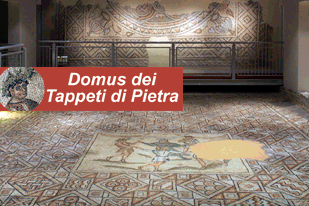OTHON I THE GREAT
OTHON I THE GREAT (912-973). Hotel in the centre to visit Ravenna
Foto:1)Ottone I and the first wife, 2)Adelaide of Borgogna?, 3)Imperial crown, 4)Ottone I, ivory,5)S.Apollinare Nuovo Ravenna, cloister
During the final years of the ninth century the Hungarians were spreading out from the steppe towards Central Europe. In Germany, after Henry, the first of the Saxon House to ascend the throne, died, his son Othon I was crowned King in 936 at Aquisgrana.
As he took his place on Charlemagne's throne, he made a clear gesture of continuity with the Carolingian tradition. In 951 he descended to Pavia and proclaimed himself King of Italy; in August 955 he definitively conquered the Hungarians and, on the battlefields, earned the acclamation of ‘Father of the Fatherland and Emperor'.
Impressed by this fame, Pope John XII invited Othon to Italy and in exchange promised him the Imperial crown: on 2nd February 962 Othon was crowned Emperor.
Just a few months had passed before the pact between Othon and John is broken, causing quite a stir: the pope had sworn loyalty to the Emperor, but being too young - he was barely eighteen - and little more than a puppet in the hands of Roman nobility, he forgot his promises and searched for new allegiances in the fatherland. Othon therefore proclaimed his famous diktat, ruling that every designated pope, in order to be formally elected, must first obtain the Emperor's grace.
Still not satisfied, he did something that would prove fatal: in 963 he came to Italy and called a council in Rome where the Pope was slanderously accused of treason: John was condemned, deposed and exiled and to all those who asked him to be merciful Othon ironically answered:
"The Pope is still a young boy and will only learn to moderate his behaviour with the example of noblemen".
Moreover, it was the city of Ravenna with its great tradition to prove itself a favourite of Othon's and he stayed in Classe in a special wing of the San Severo Benedictine monastery, specially renovated for the occasion.
The choice of Ravenna, "the most Byzantine corner of Italy", also represented his will to affirm himself in the eyes of Constantinople: an empire that arrogantly named itself heir to the Roman Empire and watched the new Imperial project of the West with suspicion. And this was the background to Othon posed the question of his son Othon II's wedding to a Byzantine princess.
In Ravenna, Othon called a Council of Bishops that was inaugurated in the Spring of 967 by the new Pope, who commended him with the expression "third after Constantine", obviously placing Charlemagne at second place. This council came to an end in the Basilica of Sant'Apollinare Nuovo in the autumn of 968: one resolution among many being the creation of the Archbishopric of Magdeborg, headed by Adalberto, who was made Primate of Germany and given the task of taking Christianity to the Slavic-controlled lands of the North, beyond Elba, and evangelising Poland following the christening of Prince Mieszko in 966.
It is certainly worth remembering that Othon I marked a new cultural flourishing in Europe, favoured by the female figures that accompanied the Saxon emperors: especially the astonishing Rosvita, a nun and extraordinary figure of early middle-age literature of the 10th century.
Prof.Gianni Morelli
The pleasure of fine accommodation in the centre of Ravenna: we recommend the Fabbri hotels for a pleasant stay as follows:
The Centrale Byron hotel, 3-star hotel in the centre of Ravenna;
The Bisanzio, 4-star hotel in the centre of Ravenna;
Once you have reached the hotel and parked your car, forget it and walk everywhere, because everything is within walking distance.
The railway station is near our hotels and within walking distance.
© reserved copyright






